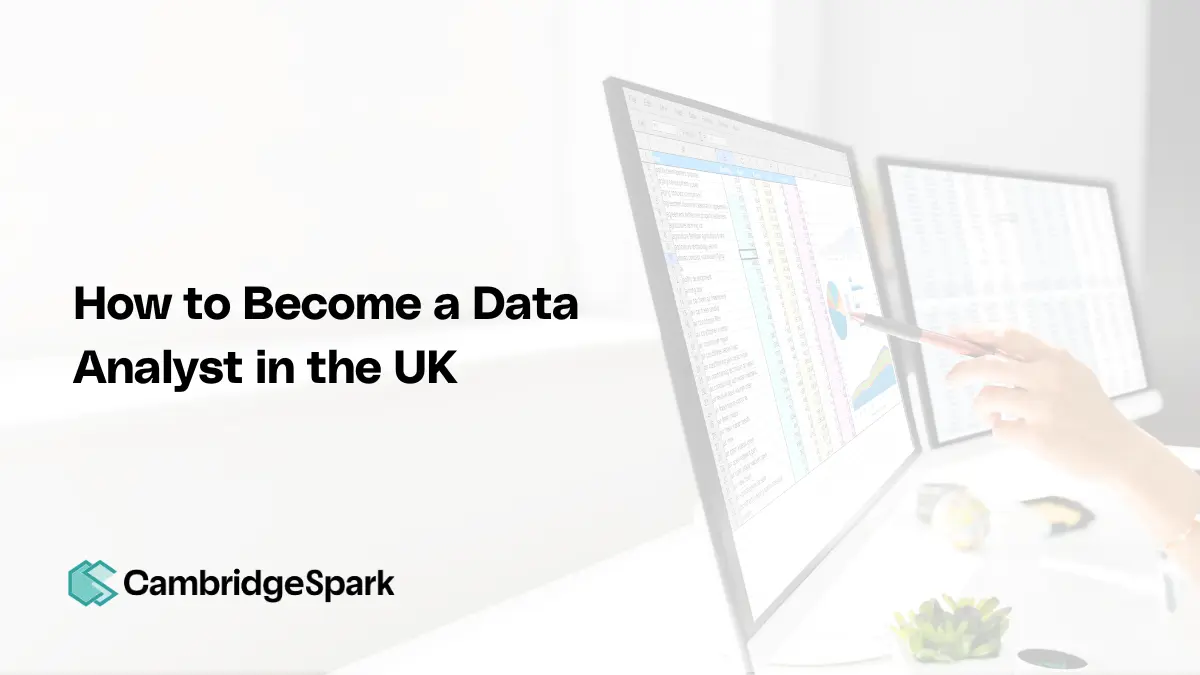As competition between businesses grows and organisations strive to become more data savvy, the need for data analysis skills is unsurprisingly booming.
The 2023 Future of Jobs report found that Data Analyst roles were amongst the top 10 jobs expected to grow the fastest between 2023 and 2027.
Data analysis can be a fulfilling and exciting career, full of unique opportunities in our data-driven business landscape. And there are many significant benefits to choosing data analysis as a career path. Here are just a few:
- A lucrative salary: As organisations increasingly rely on data insights, the value placed on skilled data analysts continues to rise, leading to attractive salaries. According to Glassdoor, the average salary for a Data Analyst in London is £40,849 per year.
- Versatility: Skills acquired in data analysis are transferable across different industries. This versatility allows you to work in diverse environments and to choose an industry that compliments your interests.
- Skill development: The role of a data analyst involves constant adaptation to new tools and technologies. This helps in fostering a continuous learning culture at work, proven to lead to increased job satisfaction.
RECOMMENDED PODCAST LISTENING: 
If this sounds like a career that you could get excited about, continue reading to find out how you can become a data analyst in the UK.
%20(1).webp?width=1050&height=591&name=Blog%20images%20(17)%20(1).webp)
What is a data analyst?
Firstly let’s explore what a typical day looks like for a data analyst to ensure it’s the right career for you.
- Assisting internal teams with data analysis: A data analyst might start their typical day by answering emails and responding to colleagues who need assistance with internal data projects. These queries could come from any department because analysts are often constantly working with various teams within their organisation. These projects usually involve collecting, cleaning, and analysing data.
- Manipulating datasets: Data analysts will manipulate and analyse datasets using tools like SQL and Python. These tools allow analysts to extract important and actionable insights and drive strategic decision-making.
- Meeting with stakeholders and communicating findings: Data analysts will frequently meet with stakeholders to discuss their data needs. Successful data analysts have good communication and data visualisation skills and are able to use specialist software like Tableau to present findings in clear, visual formats.
- Reporting and monitoring KPIs: Throughout their work days, data analysts will also create and maintain reports that track key performance indicators, troubleshoot data issues, and ensure data accuracy.
Though analyst roles are valuable roles in any industry, some sectors in which data analysts are in high demand right now are:
- Business intelligence
- Finance
- Sharing economy services (e.g Uber and AirBnB)
- Healthcare
- Entertainment
What kind of projects do data analysts work on?
When an organisation becomes more data-driven it can create many opportunities for analysts to work on stimulating data projects. These projects can reap considerable benefits for a business and seeing these positive results can be a rewarding outcome for any ambitious data analyst.
A data analyst has the opportunity to engage in a wide array of projects. Their work could range from optimising supply chain logistics by analysing transportation data, to enhancing customer experiences through the study of user interaction patterns on websites.
Taking the traditional route to become a data analyst
A data analyst degree in the UK focuses on teaching students a variety of skills that are essential for analysing, managing, and interpreting large sets of data. Though degrees are a widely recognised credential from an accredited university, they can present a few drawbacks for graduates:
- Degrees can be costly: a typical degree in the UK costs approximately £9,250 per year, totalling around £27,750 for a typical 3-year BSc degree course. And this is not including any additional maintenance costs.
- Limited applied learning: the content of a degree can often be predominantly theoretical with little or no focus on real-world, applied learning.
- Limited/no work experience: a degree may also not be immediately useful for a learner without prior work experience to accompany their degree.
.webp?width=1050&height=591&name=Blog%20images%20(16).webp)
Taking the modern route to become a data analyst
You may be wondering what we mean by the “modern route” when you’re looking to become a data analyst. Apprenticeships and Skills Bootcamps have become an increasingly popular way of earning the title of “data analyst”. And they present an aspiring analyst with some attractive benefits too.
Apprenticeships for data analytics
Apprenticeships tend to be 12-18 months or more in duration and require that learners undertake them through their employer, amongst other eligibility requirements. Though they’ve traditionally been thought as relevant only for blue-collar trades, apprenticeships are growing in popularity for digital and data skills.
Some of these benefits for learners choosing the apprenticeship route are:
- Apprenticeships are free for the learner: Perhaps the most appealing benefit that comes with an apprenticeship is that they pose no cost to you.
Apprenticeships are all fully funded by the UK Apprenticeship Levy. In short, the Apprenticeship Levy allows for organisations to upskill their employees with apprenticeship programmes without having to pay any additional costs. - Apprentices experience on-the-job learning: With an apprenticeship, learners have the chance to experience on-the-job learning. At Cambridge Spark we ensure that learners apply their newly found data analysis skills to work on projects that benefit their organisations directly.
By deploying skills into solving real-world problems early in their programme, apprentices are able to quickly make an impact in their organisation.
 "I feel apprenticeships have been stigmatised as a second-rate alternative to a university degree. But having completed a master’s degree and now approaching the completion of my apprenticeship, I can confidently say that this mode of education is far better suited to the real-world application of skills. The opportunity to learn through work-related projects, with the guidance of experienced professionals, is invaluable and has exceeded my expectations.” Alwin Raju, Senior Clinical Informatics Pharmacist at Lewisham and Greenwich NHS Trust
"I feel apprenticeships have been stigmatised as a second-rate alternative to a university degree. But having completed a master’s degree and now approaching the completion of my apprenticeship, I can confidently say that this mode of education is far better suited to the real-world application of skills. The opportunity to learn through work-related projects, with the guidance of experienced professionals, is invaluable and has exceeded my expectations.” Alwin Raju, Senior Clinical Informatics Pharmacist at Lewisham and Greenwich NHS Trust
Skills Bootcamps in data analytics
Another modern route to becoming a data analyst in the UK is to participate in a Skills Bootcamp in data analytics. Like apprenticeships, Skills Bootcamps are fully publicly funded. But they differ mainly in that Skills Bootcamps tend to be shorter programmes and they’re often open to unemployed applicants.
Some of the key benefits of enrolling in a Skills Bootcamp in data analysts are:
- Accelerated learning options: Skills Bootcamps offer a quicker way for an aspiring data analyst to enter the industry. The programmes last around 8-16 weeks and are for learners who are not currently employed.
- Employability coaching and potential job placement: As part of our Skills Bootcamp programmes at Cambridge Spark, we offer comprehensive support to help bridge the gap between learning and employment.
This includes personalised coaching sessions focused on preparing for upcoming interviews and interview techniques. We ensure that each learner is prepared for the interview and can present their skills confidently.
We support each individual to seek suitable employment through a range of sources alongside leveraging our network of industry partners to facilitate job placements, providing our learners with direct access to potential employers.
Additionally, we host workshops on resume writing, LinkedIn and job searching, further preparing our learners to excel in the job market.
 "I wanted to challenge myself and expand my skill set with a view to launching into a new career in data. Studying with Cambridge Spark gave me these new skills but it also gave me the confidence to put my new skills into practice. With the support of my tutor and employment coach, I have now started my new career as a HR & Payroll Analyst, which merged my previous knowledge and experience with my new data analyst skills. I really would recommend studying with Cambridge Spark to anyone that is looking to improve their data skills." Keren Sansom, Skills Bootcamp achiever, HR and Payroll Analyst, Libraries Unlimited.
"I wanted to challenge myself and expand my skill set with a view to launching into a new career in data. Studying with Cambridge Spark gave me these new skills but it also gave me the confidence to put my new skills into practice. With the support of my tutor and employment coach, I have now started my new career as a HR & Payroll Analyst, which merged my previous knowledge and experience with my new data analyst skills. I really would recommend studying with Cambridge Spark to anyone that is looking to improve their data skills." Keren Sansom, Skills Bootcamp achiever, HR and Payroll Analyst, Libraries Unlimited.
Conclusion
Becoming a data analyst in the UK presents a promising career path filled with opportunities for growth, lucrative salaries, and the flexibility to work across various industries.
It gives aspiring data analysts the opportunity to contribute towards the strategic success of an organisation, which can be incredibly rewarding. Whether through a traditional degree programme or modern apprenticeships and Skills Bootcamps, each educational route offers a unique experience.
If you’re ready to embark on this exciting journey, exploring a Level 4 Data Analyst Apprenticeship or Skills Bootcamp with Cambridge Spark could be the first step towards an exhilarating career in data analysis.
Get in touch via the form below and we’ll be happy to help with any additional questions you may have.





.webp?width=300&height=540&name=Becoming%20a%20Data%20Analyst%20Traditional%20vs%20Modern%20Routes%20(8).webp)
.webp?width=1000&height=550&name=Traditional%20routes%20vs%20Modern%20routes%20(3).webp)